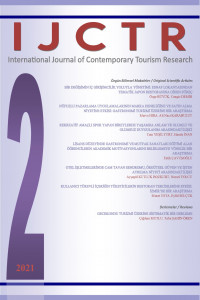Özgün Bilimsel Makale
Derleme
Sayı Editör Kurulu


 0000-0003-2253-0064
0000-0003-2253-0064


Amaç ve Kapsam
Focus and Scope of the Journal
International Journal of Contemporary Tourism Research (IJCTR) is a blind peer-reviewed international journal and publishes original papers covering a large array of topics in Tourism about economics and administrative sciences. The IJCTR will publish articles in English and Turkish. The Review offers authors the possibility to have their papers accepted in less than three months. IJCTR is open access. You can read the full text by registering to journal via http://dergipark.gov.tr/ijctr.
The IJCTR is published by the Izmir Katip Çelebi University, Faculty of Tourism (http://turizm.ikc.edu.tr/S/15907/fakulte-dergisi)
The scope of IJCTR encompasses theoretical, empirical or policy-oriented research articles, original research reports, reviews, short communication and scientific commentaries in the fields of social sciences, economics, business, management, law, political science, sociology, philosophy related with Tourism.
Yazım Kuralları
Submission: Manuscript Format
Manuscripts must include the following:
Submitted manuscripts should have an original content, and should not be published or under consideration for publication elsewhere. Although no maximum length of the papers is imposed, Author(s) are invited to write as concisely as possible. If your manuscript is considerably longer, we ask that you shorten it before submission, or it may be returned without review.
The submitted file (in .doc/.docx format) should be anonymous and should include the title of the paper, an abstract of no more than 200 words, 3 to 4 keywords, 3 to 4 JEL Classification codes, and the main text.
At the initial stage of submission Author(s) will be asked to follow the Formatting Requirements illustrated below.
Formatting Requirements
This section provides details on copy editing, typesetting, and layout requirements pertaining to final manuscript submission. All manuscripts must have correct formatting to be considered ready for publication.
- Copy edit your manuscript.
- Do not include page numbers, headers, or footers. (System will add the appropriate header with page numbers).
- Do not include acknowledgments in the initial submission. Acknowledgments may be added only after acceptance in the final version produced for publication.
- Write your article in English or Turkish. English abstract must be written for Turkish article as well.
Page Layout And Spacing
- Page size must be A4. Do not use “letter” size (17 x 24 cm).
- All margins (left, right, top and bottom) must be 2.5 cm, including your tables and figures.
- Single space your text.
- Use a single column layout with both left and right margins justified. (Footnotes and references must be both left- and right- justified as well.)
- Indent all paragraphs except those following a section heading.
- An indent should be at least 1.25 cm-spaces. However, make sure to be consistent in this.
- Equations, long quotations, theorems, propositions, special remarks, tables, figures, etc. should be set off from the surrounding text by additional space above and below.
- Do not “widow” or “orphan” text; make sure that headings are on the same page as the text that follows them, and do not begin a page with the last line of a paragraph. This also applies to titles or notes attached to tables.
- There should be no pages where more than a quarter of the page is empty space, unless it is absolutely impossible to do so.
- All text should be fully justified, left and right (i.e., flush with the left and right margins).
Fonts
- Main Body—12 pt. Times or the closest comparable font available
- Equations—12 pt. Times or the closest comparable font available
- Tables, graphs & figures—Text accompanying graphs, figures and tables should be no smaller than 8 pt.
- Use Times or the closest comparable font available, except, possibly, where special symbols are needed.
- Set the font color to black for the text.
- To indicate text you wish to emphasize, use italics rather than underlining or bold.
- Foreign terms should be set in italics rather than underlined or bold.
- Titles of books, movies, etc., should be set in italics rather than underlined or bold
Headings
Headings should be distinguished from the main body text by their fonts size. Please format headings and sub-headings as follow:
- Headings: 14pt Times, or the closest comparable font available, bold;
- Sub-headings 12 pt. Times, or the closest comparable font available, bold;
- Sub-sub-headings 12 pt. Times, or the closest comparable font available, bold.
Footnotes
- Do not use footnotes.
Tables, Figures & Graphs
- If figures are included, use high-resolution figures.
- To the extent possible, tables and figures should appear in the document near where they are referenced in the text.
- Large tables or figures should be put on pages by themselves.
- Make sure to use at least 8 pt. font size in tables, figures and graphs.
- Everything must be easily readable when viewed on a computer screen at 100% and when physically printed.
- All tables and figures must fit within margins on all sides (top, bottom, left and right) in both portrait and landscape view.
Mathematics and Equation
- Roman letters used in mathematical expressions as variables must be italicized. Roman letters used as part of multi-letter function names should not be italicized. Subscripts and superscripts must be a smaller font size than the main text.
- Use 12 pt. Times or the closest comparable font available
- Type short mathematical expressions inline.
- Longer expressions must appear as display math, as must expressions using many different levels (e.g., such as fractions).
- Important definitions or concepts can also be set off as display math.
- Number your equations sequentially.
- Insert a blank line before and after each equation.
- Put equation numbers on the right.
- Avoid symbols and notation in unusual fonts.
- When proofing your document, pay particular attention to the rendering of the mathematics.
References
- Use APA style for references [Publication Manual of the American Psychological Association]. For a summary of the APA references style see the http://www.apastyle.org/learn/tutorials/basics-tutorial.aspx
Style Guide
- Please note that IJCTR only accepts online submissions.
- The electronic file should be in MS Word for Windows (.doc/.docx). In the electronic file, please be sure to:
- Clear the file of all possible viruses
- Remove all information that could identify the author(s) of the paper (including acknowledgments and contact information); be sure to remove all identifying information from the 'File, Properties, Summary' menu.
- Place all the submission in one file.
Etik İlkeler ve Yayın Politikası
Publication Ethics and Publication Malpractice
- Is methodologically sound
- Follows appropriate ethical guidelines
- Has results which are clearly presented and support the conclusions
- Correctly references previous relevant work.
* IJCTR publishes biannually.
* IJCTR publishes in Turkish and English.
* Scientific articles are published and empirical (practical/experimental) researches are given priority in the journal.
* The responsibility of opinions expressed in articles entirely belong to the authors
* The studies submitted to IJCTR for publications must not be published in other journals before.
* The studies submitted to IJCTR should be prepared by entirely obeying the scientific ethics rules.
* Copyright fees or any other payments under another name are not paid to the authors for their articles.
* The authors who submit studies to the journal are considered as agreed not to demand this kind of claim.
Attention to Authors:
Sample ORCID number: https://orcid.org/0000-0001-2345-6789
Ücret Politikası
The International Journal of Contemporary Tourism Research (IJCTR) is open access, a blind peer-reviewed international journal published in English and Turkish. IJCTR does not charge authors for submission or publication.

